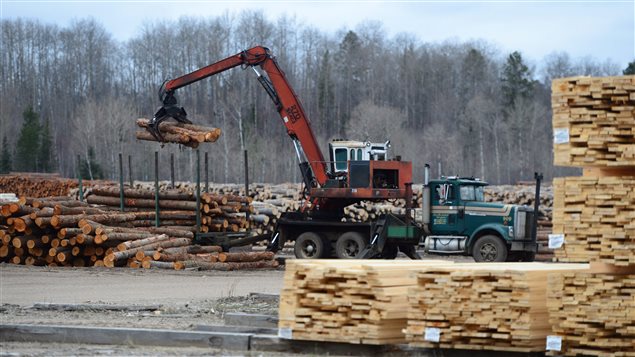Efforts to solve Canada’s festering softwood lumber trade dispute with the United States suffered another blow Thursday after the U.S. International Trade Commission unanimously voted that Canadian exports have harmed the American lumber industry.
In a 4-0 vote, the agency sided with the U.S. Lumber Coalition, a group representing U.S. lumber producers, and determined that the U.S. lumber industry is “materially injured” by imports of softwood lumber from Canada that according to the U.S. Department of Commerce “are subsidized and sold in the United States at less than fair value.”
“The U.S. Lumber Coalition fully supports the enforcement of America’s trade laws,” said in a statement Jason Brochu, U.S. Lumber Coalition co-chair and co-president of Pleasant River Lumber Company.
“The evidence presented to the ITC was clear – the massive subsidies that the Canadian government provides to its lumber industry and the dumping of lumber products into the U.S. market by Canadian companies cause real harm to U.S. producers and workers.”
The federal government will continue to vigorously defend Canada’s lumber industry, workers and communities against protectionist trade measures, Foreign Affairs Chrystia Freeland said Thursday.
“As we have said throughout this dispute, punitive U.S. countervailing and anti-dumping duties on Canadian softwood lumber are unwarranted and troubling,” Freeland said in a statement. “They are harmful to Canada and to lumber consumers in the United States.
Susan Yurkovich, President of the BC Lumber Trade Council, which represents lumber producers in British Columbia, the largest Canadian exporter of softwood lumber to the U.S., said the ruling by the commission “is completely without merit.”
“The ITC finding of ‘injury’, despite the current record-setting profitability of the U.S. lumber industry, makes it very clear that this was not an objective evaluation of the facts,” Yurkovich said.
“There can be no doubt that this process is biased in favour of the U.S. industry. To our knowledge, the ITC has never before reached an affirmative decision of injury when an industry was enjoying the most profitable period in its history, which is the case today for the U.S. lumber industry.”
The BC Lumber Trade Council will work with both federal and provincial governments to initiate appeals as soon as possible, she said.
“We are confident that the ITC decision will be overturned,” Yurkovich said. “It is noteworthy that in both Lumber 3 and Lumber 4, not one of the decisions issued by the ITC survived independent appeals, before both NAFTA and WTO panels.”
The U.S. Commerce Department last month lowered preliminary duties. Most Canadian producers will pay a combined countervailing and anti-dumping rate of 20.83 per cent, down from 26.75 per cent in the preliminary determinations issued earlier this year.
On Nov. 28, the federal government announced that it Ottawa has requested World Trade Organization consultations with Washingto over anti-dumping and countervailing duties the U.S. Department of Commerce has set on softwood lumber imports from Canada.
Canada has already challenged the countervailing duties under Chapter 19 of the North American Free Trade Agreement, Freeland said.
With files from The Canadian Press







For reasons beyond our control, and for an undetermined period of time, our comment section is now closed. However, our social networks remain open to your contributions.